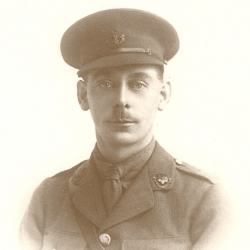William Marsden Barratt was born in Ashton under Lyne on July 10, 1891. His father, Herbert Barratt, was a railway audit clerk and the family lived in Ashton. William was the oldest of five boys. By 1911 he was living with his grandmother and aunt a few doors down from his parents and brothers on Richmond Street in Ashton and was employed like his father, and his brother Harold, as a Railway Clerk. His middle brother, George Herbert Barratt, was working as a bank clerk in the Ashton branch of the Manchester & County Bank.
Shortly after the outbreak of war William was appointed as a Second Lieutenant in the 9th Battalion Manchester Regiment (Territorial Force), along with 10 others, on October 12, 1914. His younger brother, George Herbert Barratt, followed him less than six months later on March 2, 1915. The two brothers trained together in Southport with the 2/9th before moving to Haywards Heath and Pease Pottage. 2/Lt. William Marsden Barratt was one of the 5 Officers (and 222 men) who traveled to Gallipoli in July 1915, joining the Battalion at Cape Helles on July 23rd. His brother, 2/Lt. George Herbert Barratt was destined to remain with the 2/9th when they became an independent line infantry Battalion, eventually deploying to France in March 1917.
William fought in the Battle of Krithia Vineyard and on August 28, 1915 left the Battalion for Mudros with 25 other ranks. While at Mudros he became sick with gastritis and was quickly invalided to the UK. Once in the UK, he spent some time in a nursing home in London being treated for dysentery before returning to his home in Ashton on September 26, 1915, taking medical leave until December.
Upon his recovery he rejoined the 2/9th who were, in 1916, at camp at Witley in Surrey and on June 12, 1916 he took the opportunity to marry his sweetheart Gladys Holderness (from Ashton) at Witley, his friend, and brother Officer, 2/Lt. Harold Harrison Knight serving as his best man.
In October 1916 he deployed to France and remained there until May 1917 when he was medically evacuated to England. On October 9, 1917 his younger brother 2/Lt. George Herbert Barratt was killed in action while serving with the 2/9th Battalion in Belgium.
He returned to France in February 1918 and ended his war service as a Captain (Gazetted October 7, 1917) attached to the 1/7th Battalion Manchester Regiment and was demobilised on January 30, 1919.
In 1920 he was temporarily living with his parents, who by now had moved to Southport and on June 13 his son, John Bevan Holderness Barratt, was born. John would himself go on to serve with the 9th Battalion in World War II, spending much of the war as a Japanese PoW, and continued to serve with the 9th into the 1950s.
Meanwhile, William, Gladys and John moved into a bungalow (“Cherisy”) on Mottram Old Road, in Stalybridge where they remained for many years.
Orders to reform the regiment were received in October 1920 and Lt-Col D. H. Wade was appointed Commanding Officer. A few weeks later the War Office confirmed the re-appointments of some old officers including Captain Barratt. William continued to serve in the 9th Battalion Territorials and on January 28, 1930 was promoted to Lt.-Col. when he assumed command after Lt.-Col. Beltran Ford Robinson retired. Lt.-Col. W. M. Barratt was the commanding officer of the 9th Battalion when the King and Queen visited Ashton-under-Lyne on May 20, 1938.
On March 16, 1940 he relinquished command of the 9th Battalion Manchester Regiment, Territorial Force and was attached to the Territorial Army Infantry Training Centre, (ITC), at Warwick. He was evidently unwell because he returned home and was admitted to hospital. He was discharged a couple of weeks later and attached to No. 18 I.T.C. at Carlisle. Three months later, after a stint at 304th ITC in Plymouth, he was discharged to the unemployed list. But in November 1940 he was selected as the Local Defence Commander, Hucknall Aerodrome at Ashfield near Nottingham. On July 1, 1942 he was appointed Group Defence Officer (GSO 1) for No 29 Group, Flying Training Command, RAF and remained in this position until August 31, 1944 when he was added to the unemployed list. Lt.-Col. Barratt resigned his commission with the Territorial Force on October 5, 1944.
Lt.-Col. William Marsden Barratt, T.D. died in hospital at Stockport on June 2, 1958. He was 66 years old.

